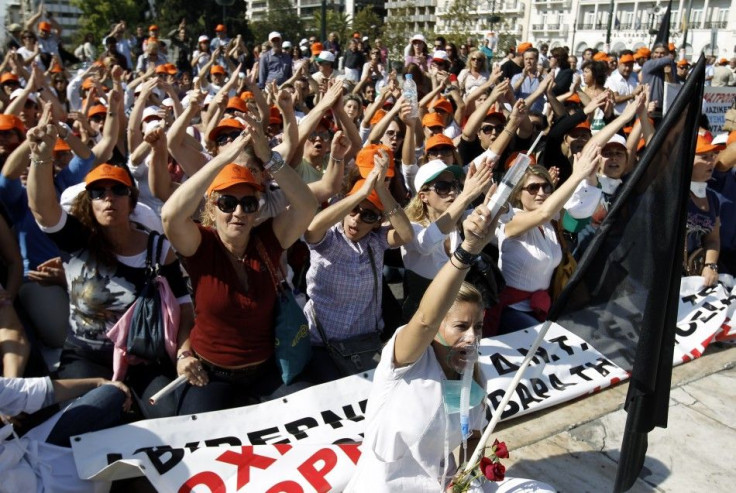Greece Austerity Strike 'Blackmailing' the Country: Papandreou

In Greece, a 48-hour general strike began Wednesday as parliament prepared to vote on an unpopular austerity package designed to bring the country out of debt.
Prime Minister George Papandreou would like to see an austerity plan passed before Sunday, when Greece is meeting at an economic summit with other European Union leaders.
The latest version of the budget-slashing bill would impose a new civil service salary system while cutting up to 20,000 public sector jobs. The government is expected to pass the plan, albeit barely, so long as all of Papandreou's Socialist party deputies vote with him.
All these people who are blackmailing and holding up the whole country, by occupying buildings, filling streets with rubbish, shutting down ports, the Parthenon, have to explain to us whether this is helping us stand on our feet, Papandreou said, according to Reuters.
The unions organizing the strike represent about half of Greece's four million workers and nearly every industry, according to Sky News, with doctors, dentists, government workers, prison guards, dock workers, shop owners, teachers and garbage collectors all walking out.
Dubbed the mother of all strikes by Greek newspapers, it's thought to be the largest in a year of protests and strikes since the country's financial woes began in 2009. More than 50,000 people gathered in central Athens, where thousands of police officers guarded the parliament and shut down subway stations.
Another 20,000 people amassed in the cities of Thessaloniki, Patras and Heraklion.
Wednesday's demonstrations have been relatively peaceful, although some protestors attacked police in parts of Athens. In what is becoming a regular event, demonstrators threw rocks at police blocking the steps of parliament, thereby spurring the officers to fire tear gas at the approaching crowd.
Two weeks ago, unions organized a 24-hour labor strike to protest austerity measures, shutting down airports and ferry lines and closing schools, government offices and tourist sites.
The government is panicking and has no strategy, Thessaloniki port union member Fani Gourgouri told Reuters. These measures are only extending poverty. We'd be willing to shoulder the cost and say 'yes' to austerity if they proceeded with reforms that would create jobs instead of cutting them.
Like they did on Wednesday, some people in the Oct. 5 strike clashed with police.
There have been demonstrations all across the country since May, although the current wave of social unrest started between late 2009 and early 2010. Last March, thousands of Greeks took to the streets to rally against a similar austerity proposal. Like the demonstrations in the capital Wednesday, a mass of students and youthful rioters broke store windows, burned cars and threw rocks and Molotov cocktails at the Greek police.
After a year of debt troubles, Greece's economic outlook has only worsened. The country's failure to slash its deficit puts a 109 billion euro ($145 million) bailout package from the European Union in jeopardy, and EU banks are waiting until November to approve the next multi-billion euro loan installment.
The government currently has enough money to pay its bills for another month, and has been trying to raise additional cash though a fire-sale of treasury bonds, according to The Associated Press.
The problems in Greece stem from years of accumulated debt, which, by 2008, totaled more than the county's entire gross domestic product. A Greek default is an international problem that could drastically impact an already struggling Eurozone.
We have very tough negotiations ahead of us, Papandreou said Tuesday. [Europe] has not been capable up till now of finding a solution, to take decisions to put an end to the uncertainty which reigns over the Eurozone or else it will be difficult for Greece and European countries to emerge from the crisis.
If Europeans fail in Greece, they will not be able to shield themselves (either).
© Copyright IBTimes 2024. All rights reserved.





















